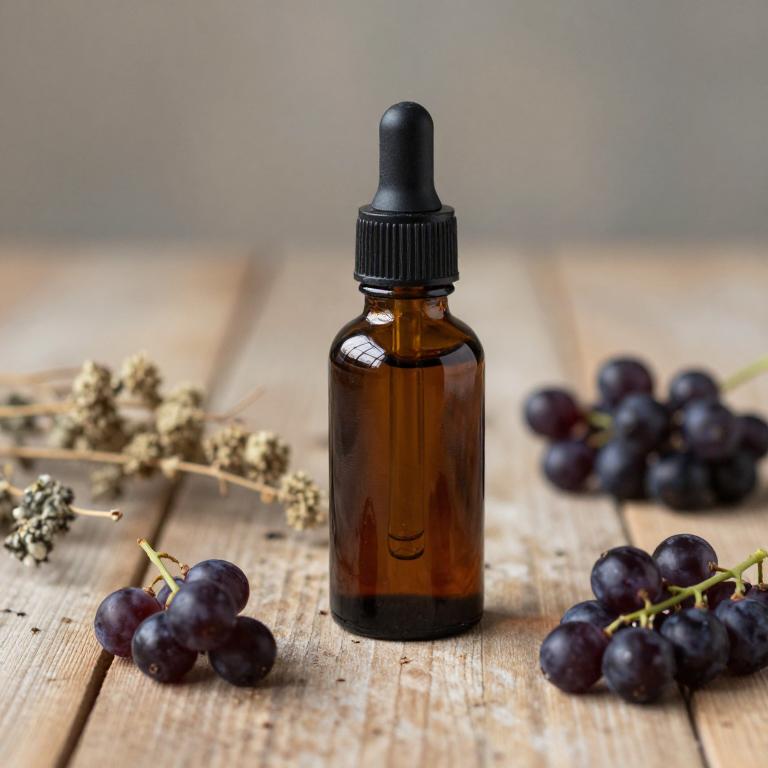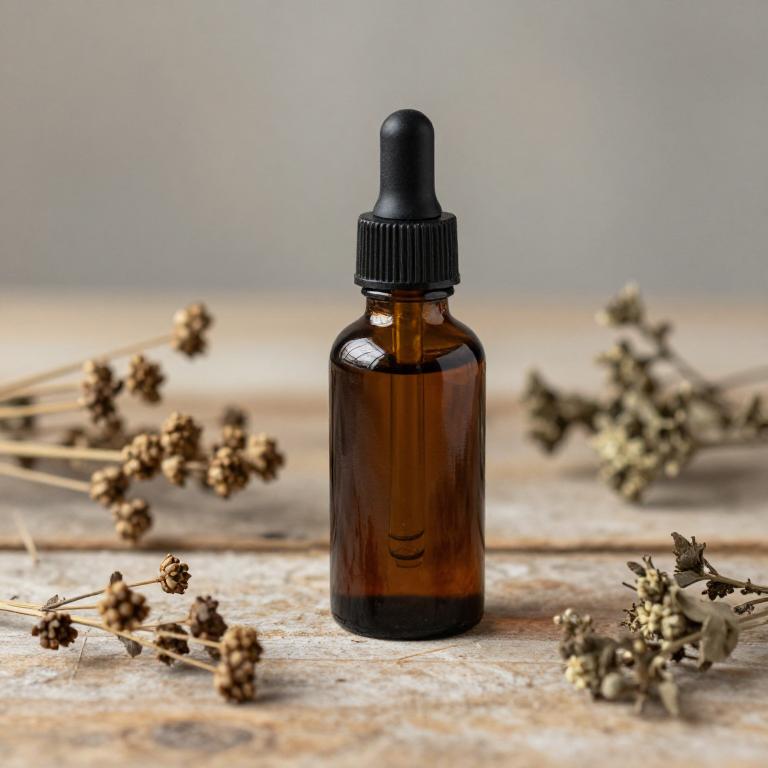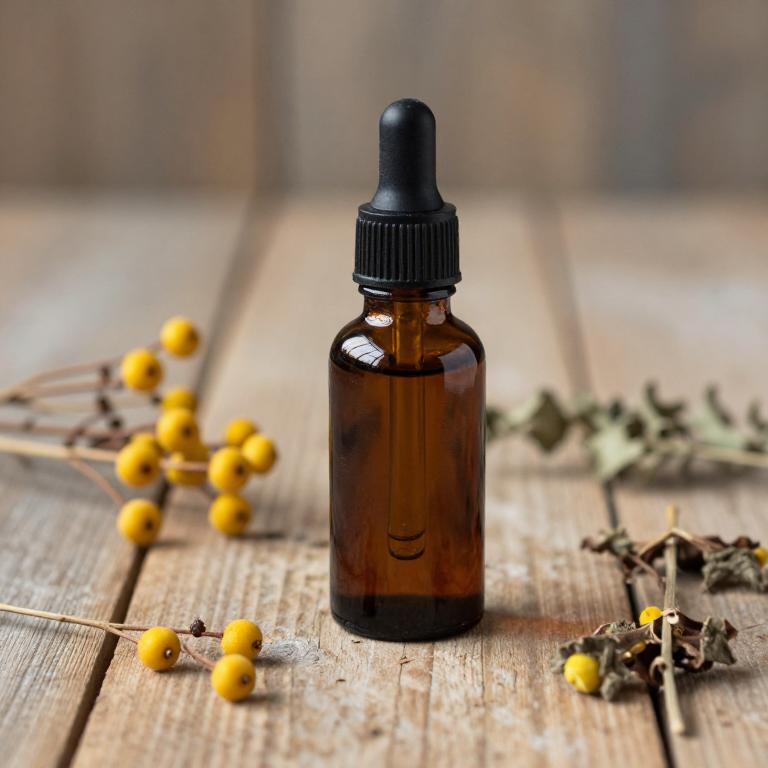10 Best Herbal Tinctures For Gout

Herbal tinctures for gout are concentrated liquid extracts made from various plants believed to have anti-inflammatory and pain-relieving properties.
Common herbs used in these tinctures include turmeric, ginger, devil's claw, and willow bark, all of which contain natural compounds that may help reduce uric acid levels and alleviate joint inflammation. While some studies suggest these herbs can provide relief, they should not replace conventional medical treatments for gout. It is important to consult a healthcare professional before using herbal tinctures, as they can interact with medications and may have side effects.
Overall, herbal tinctures may serve as a complementary approach to managing gout symptoms when used responsibly and under medical guidance.
Table of Contents
- 1. Ginger (Zingiber officinale)
- 2. Common grape (Vitis vinifera)
- 3. Turmeric (Curcuma longa)
- 4. Stinging nettle (Urtica dioica)
- 5. Blessed thistle (Cnicus benedictus)
- 6. Thistle (Silybum marianum)
- 7. Field horsetail (Equisetum arvense)
- 8. Yarrow (Achillea millefolium)
- 9. Indian barberry (Berberis aristata)
- 10. Licorice (Glycyrrhiza glabra)
1. Ginger (Zingiber officinale)

Zingiber officinale, commonly known as ginger, has been traditionally used for its anti-inflammatory and analgesic properties, making it a popular choice in herbal tinctures for managing gout symptoms.
These tinctures are typically prepared by soaking fresh or dried ginger roots in alcohol to extract its active compounds, such as gingerol and shogaol, which are believed to reduce inflammation and pain. While some studies suggest that ginger may help alleviate joint pain and swelling associated with gout, more research is needed to confirm its efficacy in clinical settings. Herbal tinctures made from zingiber officinale are often used as complementary therapy alongside conventional treatments for gout.
However, individuals should consult with a healthcare provider before using ginger tinctures, especially if they are taking medications or have underlying health conditions.
2. Common grape (Vitis vinifera)

Vitis vinifera, commonly known as the grape vine, has been traditionally used in herbal medicine for its potential health benefits, including its role in managing gout.
Herbal tinctures made from Vitis vinifera are believed to possess anti-inflammatory and antioxidant properties that may help reduce uric acid levels in the body, a key factor in gout. These tinctures are often prepared by soaking grapevine parts, such as leaves or berries, in alcohol to extract their active compounds. While some studies suggest that Vitis vinifera may support joint health and reduce gout-related inflammation, more scientific research is needed to confirm its efficacy.
As with any herbal remedy, it is important to consult with a healthcare professional before using Vitis vinifera tinctures, especially for individuals with existing health conditions or those taking medications.
3. Turmeric (Curcuma longa)

Curcuma longa, commonly known as turmeric, has been traditionally used for its anti-inflammatory and antioxidant properties, making it a popular herbal remedy for gout.
Curcuma longa herbal tinctures are concentrated liquid extracts that contain curcumin, the active compound responsible for many of its therapeutic effects. These tinctures may help reduce uric acid levels and inflammation associated with gout by inhibiting inflammatory pathways in the body. However, while some studies suggest potential benefits, more clinical research is needed to confirm their efficacy and safety for gout management.
As with any supplement, it is advisable to consult a healthcare professional before using curcuma longa tinctures, especially if you are on medications or have underlying health conditions.
4. Stinging nettle (Urtica dioica)

Urtica dioica, commonly known as stinging nettle, has been traditionally used in herbal medicine for its anti-inflammatory and diuretic properties, making it a potential natural remedy for gout.
When prepared as a tincture, Urtica dioica can help reduce uric acid levels in the body, which is a key factor in the development of gout. The tincture is typically made by soaking the dried leaves in alcohol, allowing the active compounds such as flavonoids and minerals to be extracted. Regular use of this tincture may alleviate gout symptoms by decreasing inflammation and supporting kidney function.
However, it is important to consult with a healthcare provider before using Urtica dioica tincture, especially for individuals with existing health conditions or those taking medications.
5. Blessed thistle (Cnicus benedictus)

Cnicus benedictus, also known as blessed thistle, is a herb traditionally used in herbal medicine for its potential anti-inflammatory and detoxifying properties.
While it is not specifically recommended for gout due to its high lactucarium content, which can exacerbate uric acid levels, some practitioners may use it in combination with other herbs to support overall joint health. Herbal tinctures of Cnicus benedictus are typically prepared by soaking the dried plant in alcohol to extract its active compounds, making them easy to incorporate into a holistic treatment plan. However, individuals with gout should consult a qualified herbalist or healthcare provider before using this or any other herbal remedy, as it may interact with medications or worsen symptoms.
Overall, while Cnicus benedictus has historical significance in herbal medicine, its role in managing gout remains limited and requires careful consideration.
6. Thistle (Silybum marianum)

Silybum marianum, also known as milk thistle, is a herbal plant that has been traditionally used for its potential liver-protecting properties.
While it is not a primary treatment for gout, some studies suggest that its anti-inflammatory and antioxidant compounds may help reduce uric acid levels and alleviate gout-related inflammation. Herbal tinctures made from Silybum marianum are often taken orally, typically diluted in water or another liquid, to support overall joint health. However, it is important to consult with a healthcare provider before using milk thistle tinctures, as they may interact with certain medications or have side effects in some individuals.
Despite its potential benefits, Silybum marianum should not replace conventional gout treatments prescribed by a doctor.
7. Field horsetail (Equisetum arvense)

Equisetum arvense, commonly known as field horsetail, has been traditionally used in herbal medicine for its high concentration of silica and other bioactive compounds.
Herbal tinctures made from Equisetum arvense are believed to support joint health and may help reduce inflammation associated with gout. These tinctures are often prepared by soaking the dried plant material in alcohol to extract its medicinal properties. While some studies suggest that the silica content may aid in reducing uric acid levels, more research is needed to confirm its efficacy for gout management.
As with any herbal remedy, it is important to consult with a healthcare provider before using Equisetum arvense tinctures, especially for individuals with existing health conditions or those taking medications.
8. Yarrow (Achillea millefolium)

Achillea millefolium, commonly known as yarrow, has been traditionally used in herbal medicine for its anti-inflammatory and pain-relieving properties, making it a potential candidate for managing gout symptoms.
When prepared as a tincture, achillea millefolium is typically diluted in alcohol and taken orally in small doses to harness its active compounds, such as sesquiterpene lactones and flavonoids. While some studies suggest that yarrow may help reduce inflammation and support kidney function, which are important in gout management, it is not a substitute for conventional treatments like NSAIDs or colchicine. Due to its potential interactions with medications and the risk of gastrointestinal side effects, it is advisable to consult a healthcare professional before using achillea millefolium tinctures for gout.
Overall, while yarrow tinctures may offer supportive benefits, they should be used cautiously and as part of a comprehensive treatment plan.
9. Indian barberry (Berberis aristata)

Berberis aristata, also known as the Indian barberry, is a traditional medicinal plant widely used in Ayurvedic and herbal medicine for its anti-inflammatory and analgesic properties.
Its active compound, berberine, is believed to help reduce uric acid levels in the body, making it a potential natural remedy for gout management. Herbal tinctures made from Berberis aristata are often taken orally in diluted form to support joint health and alleviate gout-related pain and swelling. While some studies suggest its efficacy in reducing inflammation, it is important to consult a healthcare provider before using it, as it may interact with certain medications.
Overall, Berberis aristata tinctures offer a complementary approach to managing gout symptoms, though they should not replace conventional medical treatments.
10. Licorice (Glycyrrhiza glabra)

Glycyrrhiza glabra, commonly known as licorice root, has been traditionally used in herbal medicine for its anti-inflammatory and antispasmodic properties.
Glycyrrhiza glabra herbal tinctures are often utilized in the management of gout due to their ability to reduce uric acid levels and alleviate joint inflammation. The active compounds in licorice root, such as glycyrrhizin and flavonoids, may support the body's natural processes in detoxification and pain relief. However, long-term use of licorice tinctures can lead to side effects like hypertension and fluid retention, so it is important to consult a healthcare professional before use.
Despite its potential benefits, glycyrrhiza glabra should be used as a complementary therapy rather than a replacement for conventional gout treatments.